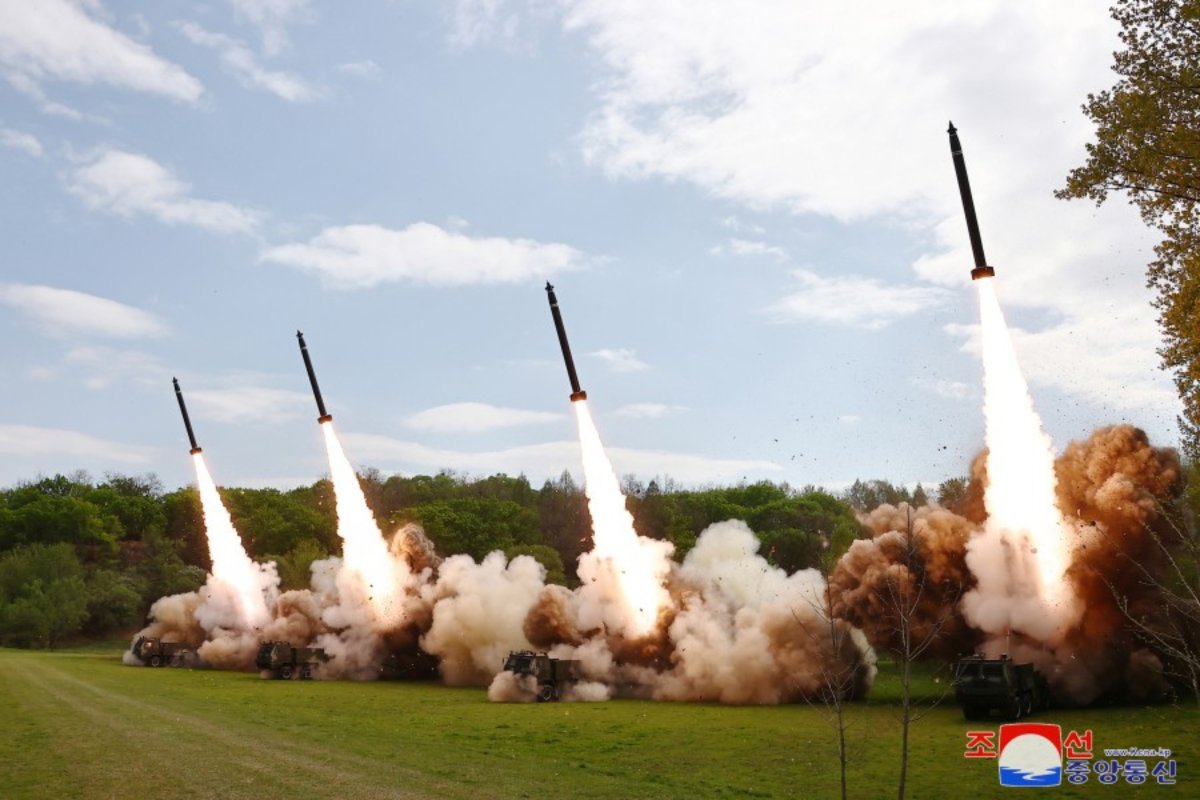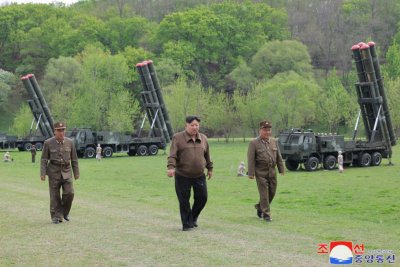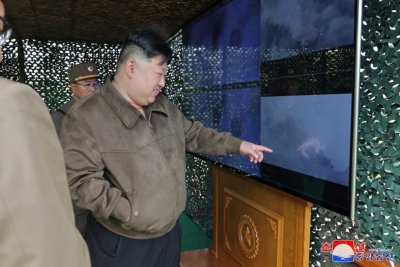North Korean leader Kim Jong Un led a tactical drill on Monday to simulate a nuclear counterattack, the country's state media said on Tuesday, a day after neighboring militaries reported the launch of multiple ballistic missiles off the Korean Peninsula's eastern waters.
The official Korean Central News Agency said Kim's regime tested for the first time a nuclear force command and control mechanism known as "Haekbangashoe"—literally "nuclear trigger"—a combined management system it described as Pyongyang's "greatest nuclear crisis alarm."
North Korea's state media coverage continues to demonstrate Kim's willingness to flout U.N. Security Council resolutions with banned ballistic missile tests and large-scale military drills near the country's border with the South.
KCNA blamed sky-high tensions on the peninsula on the "extreme war fever" of the United States and its ally South Korea, which are in the middle of their own combined air drill.

Images published by KCNA showed four missile launches for what it said were 600-millimeter "super-large multiple rocket units," which the agency said would "play an important role" in any potential future nuclear counterstrike ordered through the Haekbangashoe system.
The projectiles accurately hit a ground target at a range of 352 kilometers, roughly 218 miles, the report said.
The show of force was "a clear warning signal to the enemies as it was conducted at a time when the enemies' military confrontation racket against the DPRK is being committed with extremely provocative and aggressive nature," KCNA said, using North Korea's official name, the Democratic People's Republic of Korea.
Kim reportedly lauded the precision of the weapons system, likening it to "the firing of a sniper's rifle."
On Monday, Seoul and Tokyo each reported the detection of suspected short-range ballistic missiles fired from Pyongyang into the East Sea, better known as the Sea of Japan, around 3 p.m. local time.
Along with the U.S., both governments announced in December the activation of a real-time missile data-sharing mechanism to monitor North Korean launches.
Japan's Defense Ministry said it tracked a rocket that had traveled 185 miles before splashing into the water. The altitude and estimated flight time suggested the North Korean missiles were designed to hit sites in the South.
Kim last oversaw a test of his military's 600-millimeter multiple launch rocket systems in March. At the time, state news reports suggested the weapons could be equipped with nuclear warheads.
Lee Sung Joon, the spokesperson for South Korea's Joint Chiefs of Staff, said the North was likely exaggerating the accuracy of its rocket systems, and that the South Korean military could detect and intercept the weapons, according to The Associated Press.
Lee added that the North might have used the April 22 drill to test-fire the rocket launchers before potentially exporting them to Russia—although both Pyongyang and Moscow have repeatedly denied trading arms.
The Hawaii-based U.S. Indo-Pacific Command said the latest launch event "does not pose an immediate threat to U.S. personnel or territory, or to our allies," but said the test "highlights the destabilizing impact of the DPRK's illicit weapons program."



At a press briefing on Monday, U.S. State Department spokesperson Matthew Miller condemned North Korea's latest ballistic missile launch, which he said was "in violation of multiple United Nations Security Council resolutions."
"They pose a threat to regional and international peace and security, and this obviously will be something that will be on the agenda when the secretary travels to Beijing," Miller said, referring to Antony Blinken's visit to the Chinese capital, scheduled from April 24-26.
While in China, America's top diplomat is expected to press his Chinese counterparts on what Washington believes is their growing material support to Moscow amid Russia's war against Ukraine.
North Korea watchers believe Kim intends to ramp up the frequency of military drills in the coming months as a way to extract sanctions concessions from the U.S. in a significant presidential election year.
Over the weekend, North Korean state media announced the successful test of a new "super-large warhead" designed to fit on its nuclear-capable cruise missile.
North Korea's embassy in Beijing did not immediately respond to Newsweek's written request for comment before publication.
Uncommon Knowledge
Newsweek is committed to challenging conventional wisdom and finding connections in the search for common ground.
Newsweek is committed to challenging conventional wisdom and finding connections in the search for common ground.
About the writer
John Feng is Newsweek's contributing editor for Asia based in Taichung, Taiwan. His focus is on East Asian politics. He ... Read more
To read how Newsweek uses AI as a newsroom tool, Click here.








